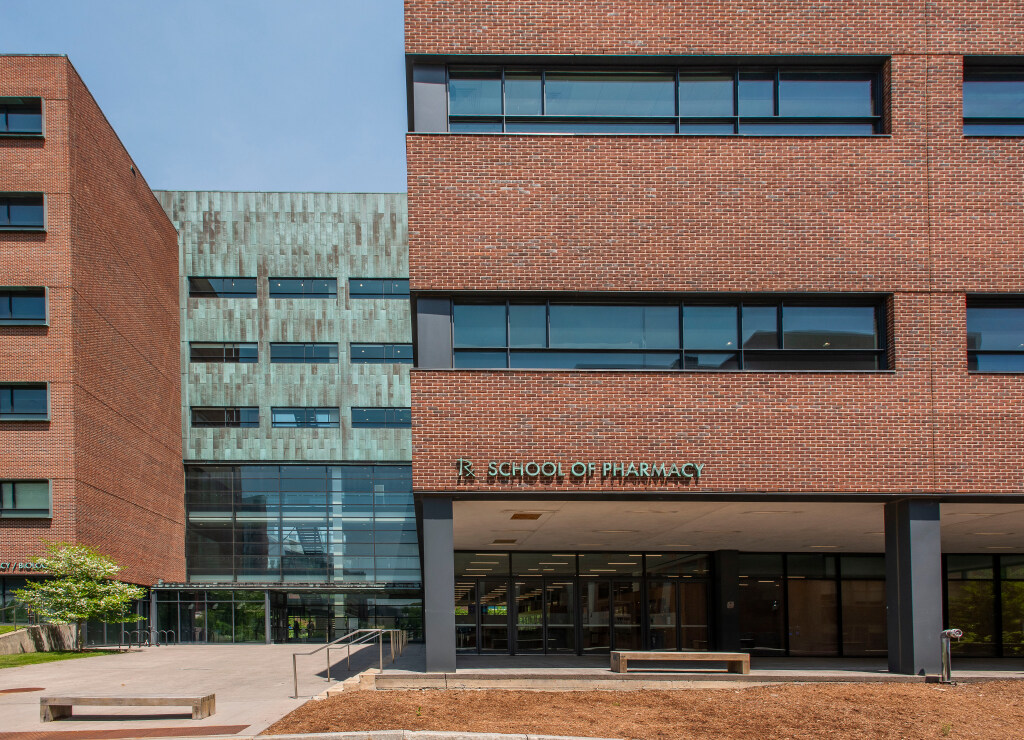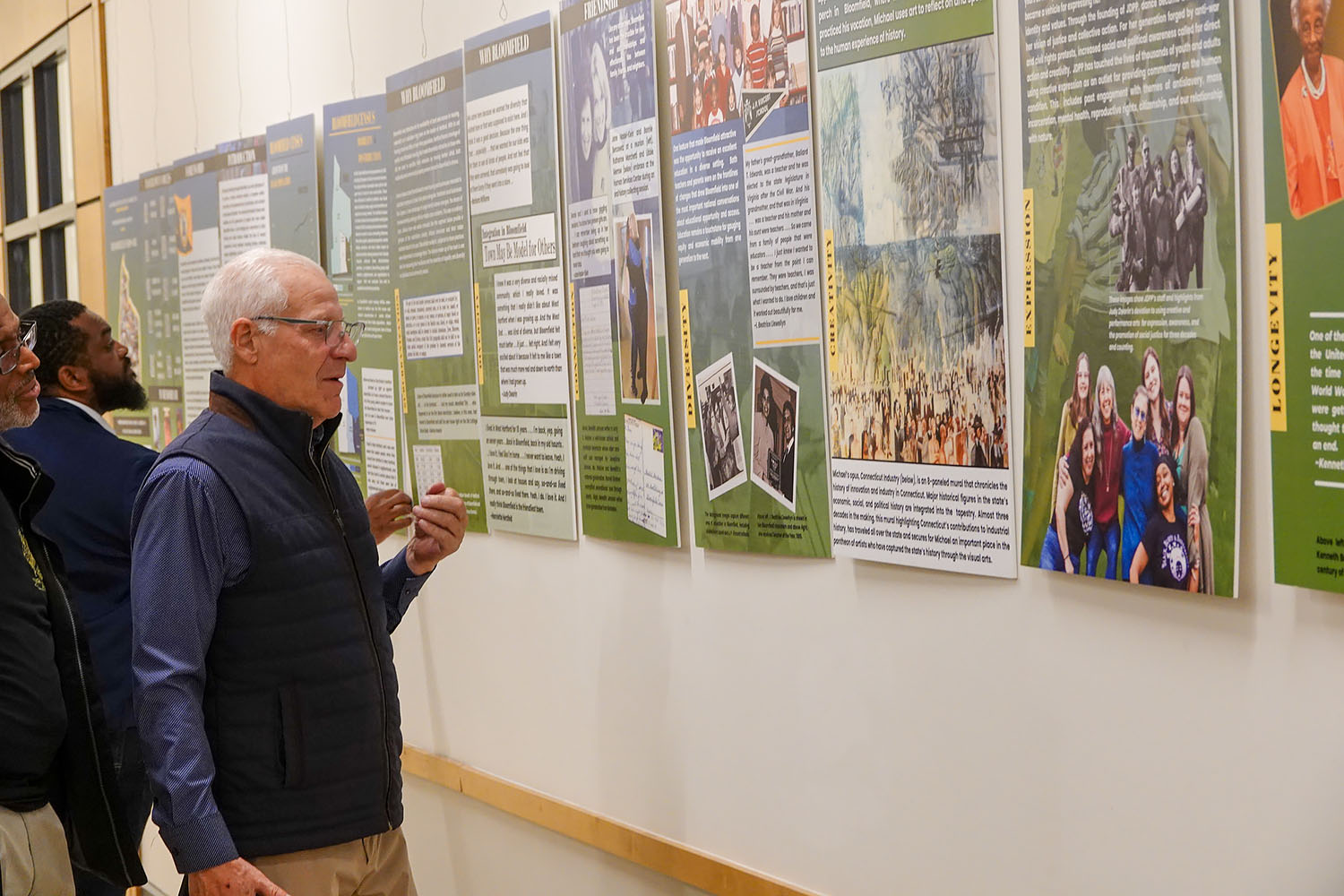
One day late this summer, Desi Nesmith ’01, MA ’02, sits in his no-frills office at America’s Choice at SAND School in the North End of Hartford. No school banner hangs on the wall. No 2009-10 calendar to remind him of his first year as a principal. No Husky blue.
He has just been trained by a “breakthrough coach” to balance his professional and personal lives by keeping them separate. Part of the deal was to make his office less homey.
“I’m going to attempt to make this adjustment. Look behind you,” he says, gesturing to boxes and bins packed with his belongings. “That was my office yesterday.”
He’s trying, but the casual visitor gets the idea this new effort will in no way temper his passion for making over a school that, before he came, was stuck on the No Child Left Behind “needs improvement” list, with state mastery test scores ranking 11th from the bottom.
“It’s my first year as principal at SAND, so I’m totally open to ways to be effective and do this job,” he says.
Last spring, Nesmith received the inaugural “Promising Young Professional Award” from the Neag School of Education Alumni Society. Nominated by Thomas DeFranco, dean of the Neag School, and Richard Schwab, former dean, Nesmith was touted by Schwab as “one of the most talented graduates that we had during my tenure as dean.” In late September, Nesmith also garnered the “Outstanding First-Year Principal Award” from the Connecticut Association of Schools.
Nesmith was selected to lead SAND in its first year under the America’s Choice school redesign. As part of that, all faculty had to reapply for their jobs, competing with applicants from elsewhere in the district. Only about a third of the original staff was selected to stay. Families could opt in or out of the school, but if they stayed, they signed a compact to commit to the project.
The result was that Connecticut Mastery Test scores showed double-digit improvement in almost every subject and grade, the greatest gains at any elementary school in the city. Third-grade reading scores from last year shot up from 22 percent at or above proficiency to almost 54 percent this year.
He’s proud of the students, of course, but especially of the teachers. “I refer to them as the ‘A Team’,” he says. “I was able to bring on staff who come here for a reason. Failure was not an option.” His big dream is to ditch the “needs improvement” rating at SAND altogether.
On the first day of school this fall, Hartford Superintendent Steven Adamowski visited SAND School as part of a tour of success stories in the district. The official state visit was featured in the CTNow section of The Hartford Courant. Nesmith credited the school’s swift progress to adhering to its learning model, which includes a 2.5-hour daily literature block; building parent and student support; and having a core of committed teachers.
They’ve come a long way at SAND. “Some kids told the assistant principal and I that ‘we used to run the building,’ and I have no doubt. They learned pretty quick that it was a new day,” Nesmith recalls.
Nesmith’s day starts at 7 a.m. with breakfast with students and sometimes parents. He checks his calendar for the day, visits classrooms to observe instruction, and then consults with Donna Wellins, the assistant principal, over lunch in her office. His afternoon is filled with meetings to gauge the status on personalized teaching plans; returning calls; and visiting specialty classes, such as art and music. He has been known to head to the gym, doff his jacket, and play a little basketball with the kids. “Of course, they don’t want you to leave, but you have to leave,” he says.
After that he often deals with budget and human resources issues, and speaks with his special education director, who is spread over one of four zones in the city.
His stories are filled with people, students, teachers, and parents from the past and present. People like Shakur Mackey, a summer school student entering the seventh grade. “This time last year he certainly gave me a run for his money. Now he’s done a 180,” Nesmith says.
Outside class that day, Shakur, dressed in a neat polo shirt and khakis, says, “I used to get in trouble a lot because I used to make bad choices. I’m making better choices.”
“He’s a work in progress,” Nesmith comments, as Shakur goes back to his expository writing exercise.
He shows off Elka Spencer’s class of sixth-graders going into seventh, who are writing reports. One student, Juan Ruiz, has written about the Butler-McCook House in the Hartford Icon Project. He interviewed the site’s manager and found out about the toys from the time period, World War I service by one of the Butlers, and the story of how the house was put back in shape after a wayward driver crashed into it a few years ago.
Nesmith mentions Grandma Mildred, the family taskmaster for another of his students. “He knows I’ll pick up the phone and call her on any little thing. She doesn’t play. She drills into this kid that he comes to school to learn. She and I are on the same page with that.”
But Nesmith’s favorite story is about CJ Morrison. As a fifth-grader in Nesmith’s class at Mayberry School in East Hartford, CJ didn’t like to write. Nesmith, then in his first teaching job, visited CJ’s home to work with him. That year, CJ scored in the proficient range of the CMTs in writing.
Now CJ, a student at Capitol Preparatory Magnet School in Hartford, reads to SAND second-graders every Tuesday. “Just to see him once a week in his tie and his jacket working with my kids …” Nesmith says of the circle of learning.
Part of Nesmith’s style is to stay in touch. He does so with Leon McKinley, his mentor, who hired him at Mayberry and promoted him along the way. McKinley, director of Hartford elementary schools, calls Nesmith “a star in the making,” who one day will be a strong superintendent. Nesmith continues to get advice from his past teaching colleagues, many of them now directing schools of their own, and checks in on myriad past students and their parents.
Maureen DeLucco, the mother of a former student at Mayberry, says, “That to me is the real test. He’ll look up the kids after they’re out of class. Some teachers, after they’re done, they’ll close the door. Not Mr. Nesmith.”
Nesmith earned a B.S. in 2001 and an M.A. in 2002 through the Neag IB/M program and completed the UCAPP administrator preparation program in May 2009. He taught for two years at Mayberry – an experience he calls “magical” – and worked as a teacher-in-residence at the Connecticut State Department of Education, where he met his wife, Aixa Couvertier, now a literacy coach at the School for Young Children on Asylum Hill in Hartford. Couvertier also graduated from Neag’s IB/M program in 1998.
“Desi has that rare quality that we admire in effective leaders,” DeFranco says, “a clear vision for the school, strong leadership skills for the teachers and staff, high expectations for the students, and a management style that helps create a safe and welcoming school environment for parents, teachers, and students.”
The feeling about Neag and UConn is mutual. “I’ve been blessed,” Nesmith says. “I’m a big fan of my UConn.”


